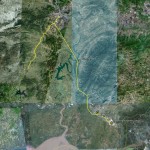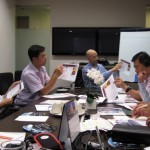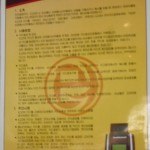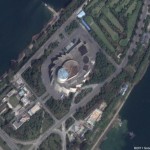Pictured above (Google Earth): The towns mentioned in the article below from which the Kaesong Industrial Zone could draw more labor: Pongchon (봉천), Kumchon (금천), and Phyongsan (평산).
Institute for Far Eastern Studies (IFES)
2011-10-20
According to South Korea’s Ministry of Unification (MOU), the “May 24 Sanctions” that went into effect after the sinking of the naval boat Cheonan was relaxed and began to permit the resumption of construction of businesses in the Kaesong Industrial Complex (KIC). In addition, plans to build fire stations and emergency medical facilities in the area are also currently underway.
After South Korean Grand National Party chairman Hong Jun-pyo visited KIC on September 30, 2011, the ROK government has reached the following decisions: 1) to allow the resumption of halted factory constructions; 2) to build a fire station and emergency medical facility; 3) to resume repair work for commuting roads for KIC employees; and 4) to extend the operations of commuter buses.
This means seven companies that received permits in the past to begin construction but stopped after the sanctions went into effect would be able to resume the halted construction projects.
According to the Ministry of Unification, the seven companies include three metal and machinery, three textile, and one electronic factories, taking up a total area of 103,527 square meters. The total site of production facilities of stage 1 businesses in the KIC reaches 2,171,900 square meters, in which the currently operating 123 companies take up 783,471 square meters. With the sanctions lifted, the total area of businesses in operation will reach 885,950 square meters.
In addition, five companies awaiting construction for expansion will have to wait a little longer. The authorities announced to discuss this issue at a later date, looking positively on their construction to resume shortly as well.
Also the MOU announced to push forward with the establishment of fire stations and emergency medical facilities, “to protect the properties and health of businesses and employees of the KIC. The plans to break ground for fire station will begin in mid-November and is expected to be completed by late next year.”
The layout for the KIC fire station was completed in December 2009 and 3.3 billion USD has been budgeted to fund the construction. The station will be constructed on a steel frame on a 3,305 square-meter lot with the total floor space to be around 2,182 square meters.
The Kaesong Management Committee has been operating a “fire/police station” from April 2005. But with occurrences of accidental fires since last winter, it has reinforced the number of fire engines and manpower – currently at a total of eight fire trucks and 36 fire fighters.
Medical facilities in the KIC will also be completed by the end of 2012 once the construction begins early next year. About 3 billion USD is set for this project.
Currently at the KIC, Green Doctor’s Cooperation Hospital is in charge of providing medical and health services in the KIC, with South Korea Green Doctor’s Kaesong Hospital treating the South Korean employees and North Korean Comprehensive Clinic treating the North Korean employees exclusively. The South Korea Green Doctor’s Kaesong Hospital is currently operated by volunteers at a clinic level. The hospital was in the process of improving the facilities to more than ten beds. However, this project was halted after the May 24 sanctions went in effect.
On another note, the MOU also announced that maintenance work for the road connecting Kaesong City to the KIC would begin. The road is normally used by North Korean employees of the KIC. It was also announced that the number and operation of commuter buses would increase to help with the commute. The buses operate in the 20 km radius; the plan is to increase that to 40 km. Since September 2010, the number of buses increased to 400.
There are plans to extend the service to cover the areas of Kumchon, Bongchon, and Pyongsang. However, the roads to these areas are unpaved and extension of transportation services to these areas will require negotiations with the North Korean authorities.
Although these measures will alleviate some of the problems faced by the businesses in the KIC, the MOU still stands firm on its position that North Korea must take responsibility and make formal apology for the Cheonan incident in order for a fundamental resolution of the situation to occur.






